image
Oil Rig Security Booths: Guarding Drilling Operations
The oil and gas industry is pivotal in fueling our modern civilization. Drilling operations are essential for accessing the vast energy resources buried beneath the earth’s surface. However, this industry has inherent dangers and complexities, requiring an unwavering commitment to safety and security.
The world of drilling is fraught with risks. Technical failures and the looming potential for catastrophic oil spills underscore the perils those who work on oil rigs face. Safeguarding these operations and the individuals who labor on these structures is a matter of paramount importance. In this regard, oil rig security booths emerge as a critical solution.
Oil rig security booths serve as the first line of defense, protecting drilling platforms from various physical and environmental threats. In this article, we will explore the vital role these security booths play in ensuring drilling operations’ security, safety, and sustainability. We will delve into their design, deployment, and the advanced technology that underpins their effectiveness.
But the story doesn’t end there. Behind the façade of these pragmatic structures lies a world of innovation and intrigue that warrants closer examination.
Join us as we uncover the critical functions of oil rig security booths as the unsung heroes of drilling operations.
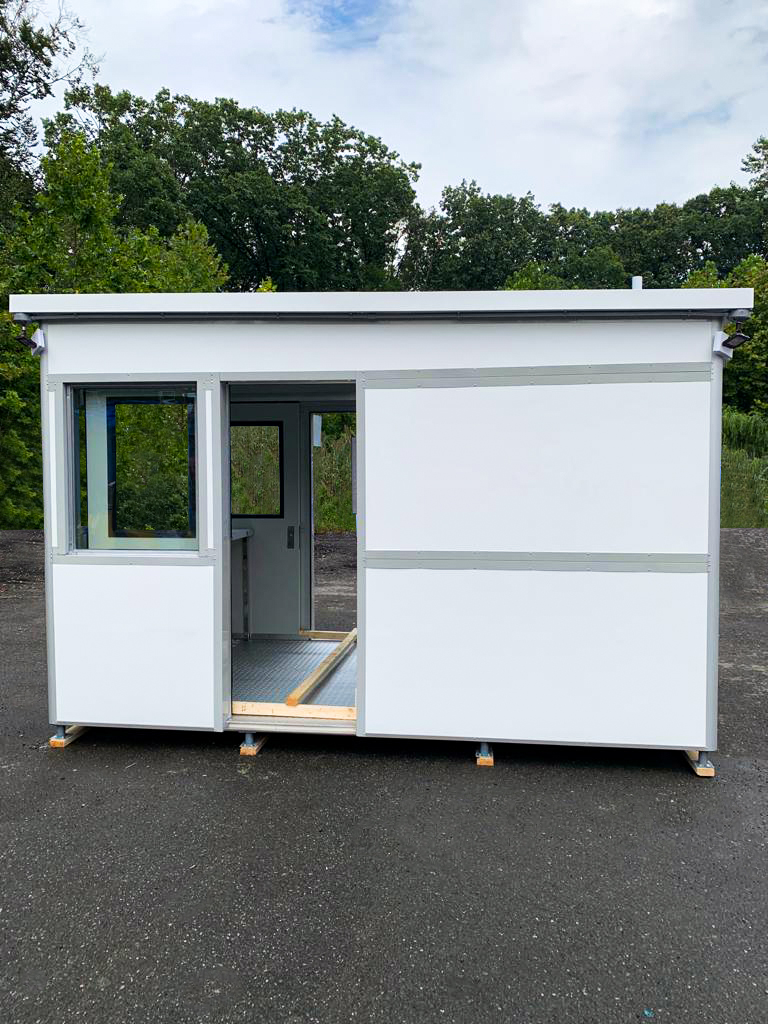
How to Ensure Oil Rig Safety?
Safety is paramount in the high-stakes world of drilling. Ensuring the well-being of personnel, protecting the environment, and maintaining the integrity of the operation are fundamental objectives.
To achieve these goals, the oil and gas industry has developed a comprehensive set of safety measures and protocols that are rigorously adhered to on oil rigs.
Here are some steps that must be followed to ensure oil rig safety:
- Rigorous Training Programs: Every member of an oil rig team, from the seasoned veteran to the newcomer, must undergo intensive safety training. This training covers emergency procedures, equipment operation, and the safe execution of job-specific tasks. These programs ensure everyone on the rig is well-prepared to respond to any situation.
- Strict Regulatory Compliance: Governments and international organizations have established stringent regulations for drilling operations. These regulations cover everything from safety equipment standards to environmental protection measures. Compliance is not an option but a mandatory requirement for every oil rig operator.
- Regular Inspections and Maintenance: Oil rig equipment is subject to harsh conditions. Regular inspections and maintenance routines ensure that all machinery and safety systems are in optimal working condition. This preventative approach helps avoid accidents and breakdowns.
- Hazard Identification and Risk Assessment: Oil rig operators conduct continuous hazard identification and risk assessment processes. This involves identifying potential risks, assessing their likelihood and impact, and implementing mitigating controls. Constant vigilance is critical in a constantly evolving work environment.
- Comprehensive Safety Protocols: Drilling operations have established safety protocols for every task, from routine maintenance to complex well control procedures. These protocols are meticulously followed to minimize the chance of accidents and to ensure that all workers know how to respond in emergencies.
- Emergency Response Planning: Oil rigs have detailed emergency response plans. These plans encompass evacuation procedures, well-controlled measures, and responses to environmental incidents. All personnel are well-versed in these protocols and ready to act swiftly in emergencies.
- Investment in Technology: The oil and gas industry continuously invests in cutting-edge technology to enhance safety. This includes advanced monitoring systems, robotics, and automation to reduce human exposure to high-risk areas.
Maintaining a safe working environment on oil rigs cannot be overstated. Not only does it protect the lives of those working on these structures, but it also safeguards the environment and ensures the continued operation of the drilling platform.
By prioritizing safety measures and protocols, the industry protects its assets and ensures a sustainable and secure energy future.
Importance of Oil Rig Security
Oil rig security and safety measures cannot be overstated. These measures are the guardians of personnel, equipment, and invaluable assets on drilling rigs, mitigating the inherent dangers in oil rig work. Drilling rig safety is more than just a priority; it’s necessary.
Here are some reasons why oil rig security is so utterly important:
- Protection of Human Lives: The first and foremost reason for stringent oil rig security is safeguarding human lives. Oil rig personnel work in a demanding and often dangerous environment. Oil rig security measures are in place to minimize the potential for accidents and injuries, ensuring the safety of all on board.
- Asset Protection: Oil rigs represent substantial investments in both equipment and infrastructure. These assets are critical to the success of drilling operations. Robust oil rig security safeguards these valuable assets from theft, damage, or destruction.
- Environmental Stewardship: The ecological consequences of security breaches on oil rigs can be catastrophic. Oil spills or contamination of surrounding marine ecosystems can result from security incidents, endangering fragile ecosystems and causing long-lasting damage. Drilling rig safety, including security measures, aims to prevent these incidents by deterring unauthorized access and vandalism.
- Operational Continuity: Security incidents can disrupt drilling operations, causing costly delays and downtime. These interruptions result in financial losses and can affect the global energy supply chain. Ensuring oil rig security is critical to maintaining the continuity of drilling operations.
- Reputation and Legal Compliance: The oil and gas industry operates under strict regulatory frameworks designed to protect the environment and ensure safety. Security breaches can lead to legal repercussions, regulatory penalties, and damage to a company’s reputation. Compliance with drilling rig safety measures helps prevent such issues and demonstrates a commitment to ethical and responsible drilling practices.
- Geopolitical Considerations: Drilling operations often occur in waters or regions with complex geopolitical dynamics. Ensuring the security of these operations is vital to maintaining national and global energy security. It also plays a role in international relations and diplomatic efforts.
- Enhanced Emergency Response: Drilling rig safety is about deterring threats and enabling rapid and effective incident response. A well-established oil rig security and safety infrastructure can support swift and efficient rescue and recovery efforts in accidents, natural disasters, or emergencies.
- Insurance and Risk Management: Robust oil rig security measures can lead to more favorable insurance terms and premiums for oil rig operators. Demonstrating a commitment to drilling rig safety is a proactive step in risk management, which can lead to significant cost savings over time.
Oil rig security and safety are fundamental pillars of drilling operations. They serve as a protective shield around personnel, equipment, and assets. The importance of security and safety extends beyond financial considerations; it encompasses environmental preservation, legal compliance, and international energy security. Rigorous security and safety measures protect the operators’ immediate interests and contribute to the responsible and sustainable future of the oil and gas industry.
Oil Rig Security Challenges
The oil and gas industry’s drilling operations present a unique set of security challenges that demand meticulous attention to oil rig security booths, drilling rig safety, and addressing the dangers associated with oil rig work.
These challenges arise from the remote locations, the potential threats, and the imperative to safeguard against unauthorized access, vandalism, and sabotage on oil rigs.
Let’s take a closer look:
- Remote Locations: Drilling rigs are often situated in remote and isolated locations, far from the prying eyes of the mainland. These lonely, expansive waters can complicate security logistics, making it more challenging to promptly respond to emergencies or unauthorized intrusions.
- Geopolitical Instability: The geopolitical dynamics surrounding many drilling sites add a layer of complexity to oil rig security. International waters can be subject to territorial disputes and competing claims, introducing potential security concerns and complicating regulatory oversight.
- Unpredictable Weather: Drilling is frequently subject to unexpected and extreme weather conditions, which can endanger personnel and security assets. Securing oil rigs in the face of storms, heavy seas, and other natural forces is a constant challenge.
- Maritime Threats: Oil rigs are vulnerable to maritime threats such as piracy, which can pose a significant danger to personnel and assets. Responding to these threats while maintaining drilling rig safety is a delicate balance.
- Unauthorized Access: Preventing unauthorized access to drilling rigs is paramount. The possibility of intruders gaining access to the rig poses risks to personnel and the security of the operation and its assets.
- Vandalism and Sabotage: Vandalism and sabotage are real concerns on oil rigs. Damage to critical equipment, pipelines, or infrastructure can result in substantial financial losses, environmental damage, and safety risks. Security measures must account for the potential for deliberate acts of destruction.
- Environmental Risks: Ensuring drilling rig safety includes addressing potential ecological threats. Unauthorized access or tampering with safety systems can lead to oil spills or other ecological disasters. Preventing these risks is paramount for environmental stewardship.
- Human Factors: Security breaches can also result from human factors, including disgruntled employees or contractors. Managing these internal security risks requires effective monitoring and reporting mechanisms.
- Technical Vulnerabilities: As drilling rigs become increasingly connected and reliant on digital technology, they become susceptible to cyber threats. Protecting against cyberattacks is an emerging challenge that requires constant vigilance.
Addressing these oil rig security challenges necessitates a multi-faceted approach encompassing proactive measures such as enhanced surveillance, security training, advanced security technology, and a culture of drilling rig safety. The industry’s ability to adapt and respond to these challenges will be crucial in maintaining drilling operations’ security, safety, and integrity while addressing the dangers inherent to oil rig work.
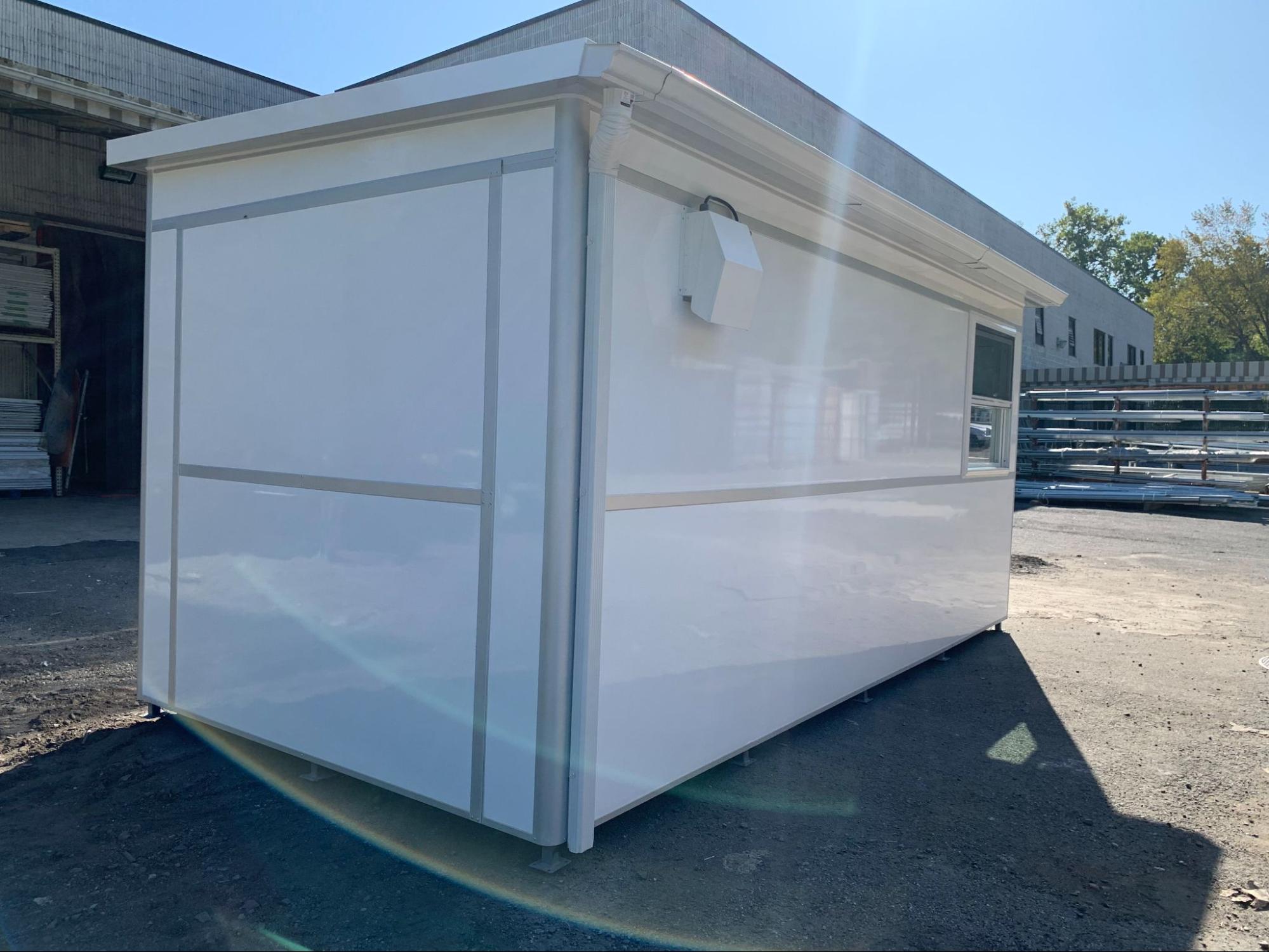
Role of Oil Rig Security Booths
Oil rig security booths enhance security and safety on drilling platforms, serving as the frontline guardians against many potential threats.
Their deployment provides various benefits, including adequate access control, surveillance, and facilitating emergency response measures.
Learn more about the role of oil rig security booths below:
- Access Control: Security booths are the first line of defense against unauthorized access to the oil rig. They serve as controlled entry points where personnel, visitors, and supplies are carefully vetted before being allowed on board. This meticulous access control prevents security breaches and helps ensure that only authorized individuals are present on the rig, contributing to drilling rig safety.
- Surveillance: Oil rig security booths have advanced surveillance technology, including CCTV cameras and monitoring systems. These tools enable real-time monitoring of activities on the rig, perimeter, and surrounding waters. Surveillance deters potential threats and provides valuable data for security assessment and response.
- Emergency Response Coordination: In the event of security incidents, medical emergencies, or natural disasters, security booths serve as critical coordination hubs for emergency response. They have communication systems to relay information, dispatch response teams, and ensure that drills or incidents are managed promptly, minimizing risks to personnel and assets.
- Deterrence: The visible presence of security booths acts as a deterrent to potential intruders, vandals, or saboteurs. The knowledge that there are handled security posts with access control measures in place dissuades individuals with malicious intent and contributes to oil rig security.
- Asset Protection: Security booths house security personnel trained to respond swiftly to security threats. Their presence is essential for asset protection, as they can assess, report, and respond to any situation that may put valuable equipment or infrastructure at risk.
- Safety Oversight: Security personnel in these booths are not solely concerned with security but also play a role in drilling rig safety. They monitor and report safety breaches, unsafe practices, or hazardous conditions to ensure that drilling operations adhere to the highest safety standards.
- Environmental Safeguarding: Security booths are part of the broader environmental protection framework. They contribute to environmental stewardship by preventing unauthorized access, vandalism, or sabotage that could lead to oil spills or ecological damage.
- Record Keeping: Security booths often maintain records of rig personnel, equipment, and supply movements. This record-keeping serves as an audit trail for accountability and can be invaluable for post-incident analysis and investigations.
In summary, oil rig security booths are indispensable components of drilling operations, providing a critical layer of protection. Their role extends beyond security, encompassing drilling rig safety, access control, surveillance, and emergency response coordination. The benefits they offer regarding safeguarding personnel, assets, and the environment are invaluable in an industry where the stakes are high and the margin for error is minimal.
Features and Design of Oil Rig Security Booths
Oil rig security booths are meticulously designed structures that play a vital role in ensuring the safety and security of drilling operations. These booths’ features and design elements are carefully crafted to withstand the environment’s unique challenges, address the dangers inherent in oil rig work, and uphold drilling rig safety.
One of the paramount features of oil rig security booths is their durability. These structures are built to withstand environments’ harsh and corrosive conditions. They are often constructed using stainless steel or other corrosion-resistant alloys to ensure long-lasting performance. This durability not only prolongs the lifespan of the booths but also minimizes maintenance requirements.
Drilling rigs are exposed to extreme weather conditions. Booths are designed to be weather-resistant, with robust sealing and weatherproofing measures to protect against the elements. This is essential for maintaining the structural integrity of the stalls and ensuring the safety of personnel inside.
The drilling industry recognizes the potential threat of explosions or blasts due to the presence of flammable substances. To address this concern, some oil rig security booths are designed to be blast-resistant. They are constructed with reinforced walls and windows that can withstand the force of an explosion, protecting personnel within and preventing further damage to the rig.
Security booths are equipped with advanced technologies to enhance their effectiveness. These may include state-of-the-art surveillance systems, access control mechanisms, biometric authentication, and communication systems. Such technologies enable real-time monitoring, quick response to security incidents, and effective coordination of emergency response efforts.
The security booth design considers the comfort and functionality of the personnel stationed inside. Ergonomic layouts, seating arrangements, and workstation design ensure that security personnel can perform their duties efficiently, especially during extended shifts.
Oil rig security booths are designed to comply with industry safety standards and regulations. They must adhere to rigorous safety criteria to ensure the well-being of security personnel, visitors, and the overall drilling rig safety.
In conclusion, the features and design elements of oil rig security booths are carefully tailored to address drilling operations’ specific needs and challenges. Their durability, weather resistance, blast resistance, advanced technologies, and compliance with safety standards make these structures essential for oil rig security and drilling rig safety. They protect valuable assets and play a vital role in preserving human lives and the surrounding environment in an industry where safety is paramount.
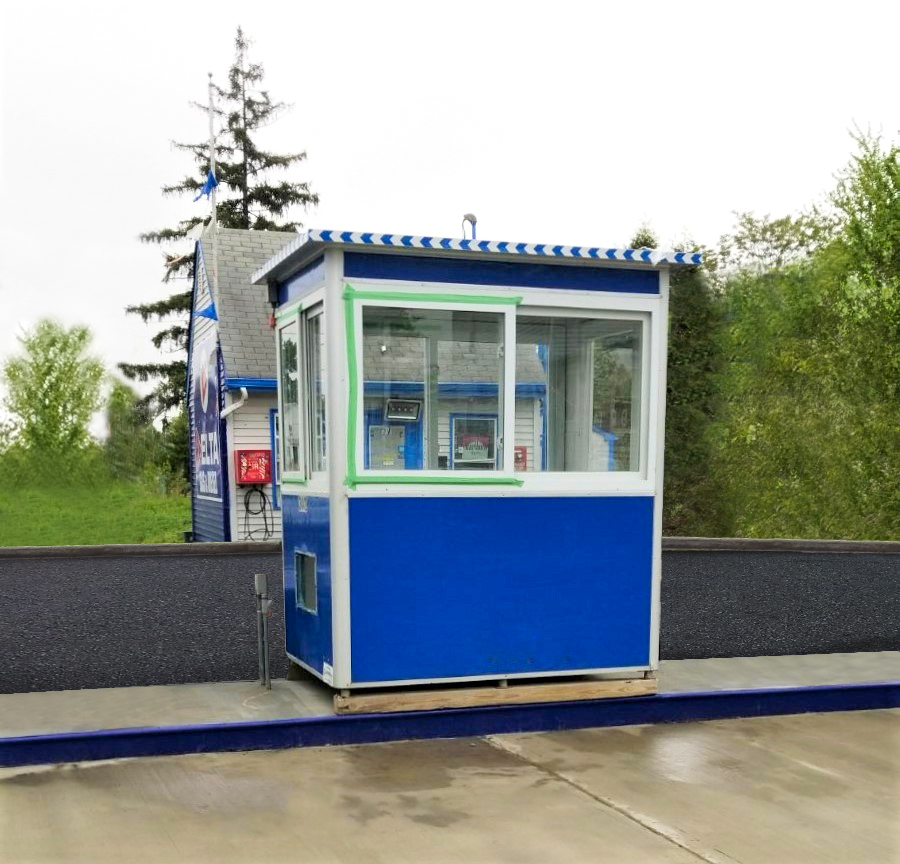
Integration of Security Booths with Security Systems
Oil rig security booths serve as the first line of defense in drilling operations. However, their effectiveness is greatly amplified when integrated with advanced security systems.
These systems encompass the following:
- Surveillance Cameras: Integrating surveillance cameras with security booths continuously monitors the rig and its surroundings. High-resolution cameras capture critical visual data, helping security personnel detect unauthorized access, unusual activities, and potential security threats in real-time. This proactive surveillance deters incidents and assists in incident assessment and response.
- Access Control Integration: Security booths are the primary entry and exit points, making them ideal locations for integrating access control systems. These systems can include key card readers, biometric authentication, and turnstiles to ensure only authorized personnel can access the rig. Integrating these access control mechanisms with the security booth streamlines the process and adds an extra layer of security.
- Alarms and Notifications: Integration with alarm systems is essential for immediate incident response. In the event of unauthorized access, security breaches, or safety incidents, alarms in the security booth can trigger swift response actions. These alarms can also be integrated with notifications to relevant personnel, ensuring a coordinated reaction to address emergencies and maintain drilling rig safety.
- Centralized Monitoring: Integrating security systems with the security booth enables centralized monitoring. Security personnel stationed in the booth can oversee multiple security cameras, access control points, and alarm systems from a single location. This efficiency is invaluable in maintaining continuous surveillance and expeditious response.
Benefits of a Comprehensive Security System in Oil Rig Operations
Integrating security booths with advanced security systems offers oil rig operators a range of benefits, significantly enhancing the overall security and safety of drilling operations.
Comprehensive security systems facilitate immediate response to incidents when integrated with security booths. This quick reaction time is crucial in addressing security breaches and safety emergencies, thereby minimizing risks to personnel and assets.
Surveillance cameras integrated with security booths provide a 24/7 watchful eye over the rig. This constant vigilance deters potential threats and assists in incident investigation and post-incident analysis.
Integration of access control systems ensures that only authorized personnel are allowed on the rig. This reduces the risk of unauthorized access and enhances overall drilling rig safety.
Centralized monitoring and integration of various security systems in the security booth streamline security operations. This efficiency improves the security team’s effectiveness, improving overall overall oil rig security.
A comprehensive security system that includes integrated security measures is more likely to meet the stringent regulatory requirements governing drilling operations. Compliance with these regulations is vital for both operational and environmental safety.
In conclusion, integrating security booths with advanced security systems is a strategic move that significantly enhances oil rig security, improves drilling rig safety, and mitigates the dangers inherent to oil rig work. Oil rig operators stand to gain from the comprehensive protection provided by these systems, ensuring the safeguarding of personnel, assets, and the environment while maintaining the integrity of drilling operations.
Compliance with Safety Regulations
Ensuring compliance with safety regulations and industry standards is of utmost importance in drilling, where oil rig security and drilling rig safety are paramount concerns.
The oil and gas industry operates within a rigorous framework of safety regulations and industry standards, many of which are enforced by governmental bodies and international organizations. These regulations are specifically designed to address the unique hazards associated with oil rig operations, encompassing critical aspects of drilling rig safety, including structural integrity, safety equipment, emergency response protocols, environmental protection, and security measures such as deploying oil rig security booths.
Compliance with safety regulations extends far beyond mere legal obligations; it represents a profound moral imperative. Failing to adhere to these regulations can lead to catastrophic consequences, including accidents, environmental disasters, and tragic loss of life. By steadfastly adhering to drilling rig safety regulations, the industry erects a sturdy defense against such potential calamities, minimizing risks and ensuring the uninterrupted continuity of drilling operations.
Moreover, compliance with safety regulations is significantly bolstered by the presence of oil rig security booths. These booths are integral to maintaining a safe working environment, as they offer a secure location for monitoring and responding to potential security threats.
In addition to essential compliance, the best practices in drilling rig safety go a step further, encompassing the minimum requirements and proactive measures. These measures include routine safety audits, ongoing training programs, adopting advanced technologies, and fostering a robust safety culture. By embracing these practices, the industry fortifies its commitment to safety and maximizes the effectiveness of oil rig security booths and other safety measures.
In the context of compliance, it’s also crucial to recognize the environmental aspect. Safety regulations emphasize the need to protect marine ecosystems and minimize the environmental impact of drilling operations. Rigorous adherence to ecological rules ensures that the industry operates in an environmentally responsible manner, reducing the risk of oil spills and other environmental disasters.
In conclusion, compliance with safety regulations and industry standards is not only a legal requirement but an ethical commitment to the safety of personnel, the protection of the environment, and the sustainability of drilling operations. Oil rig security booths play a pivotal role in helping the industry maintain this commitment by ensuring that safety regulations are met while safeguarding against potential security threats, ultimately promoting a culture of safety and security within the industry.
Recent Blogs
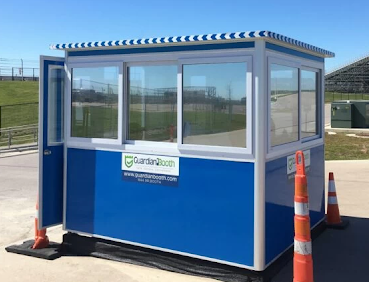
Creating Portable Break Areas for Agriculture Staff with Prefab Booths
In the demanding world of agriculture, staff members often face challenges finding suitabl…
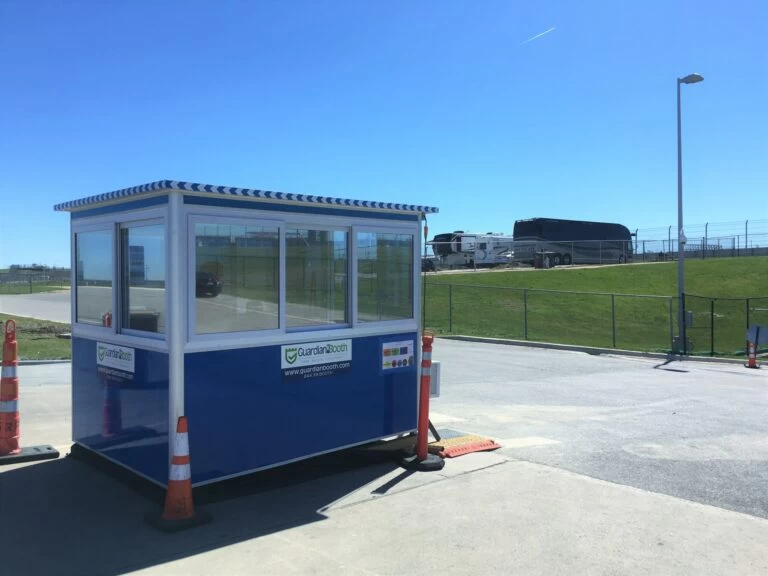
Utilizing Portable Booths as Make-Shift Shelters in Agriculture Fields
In the vast expanse of agriculture fields, specific situations necessitate the establishme…
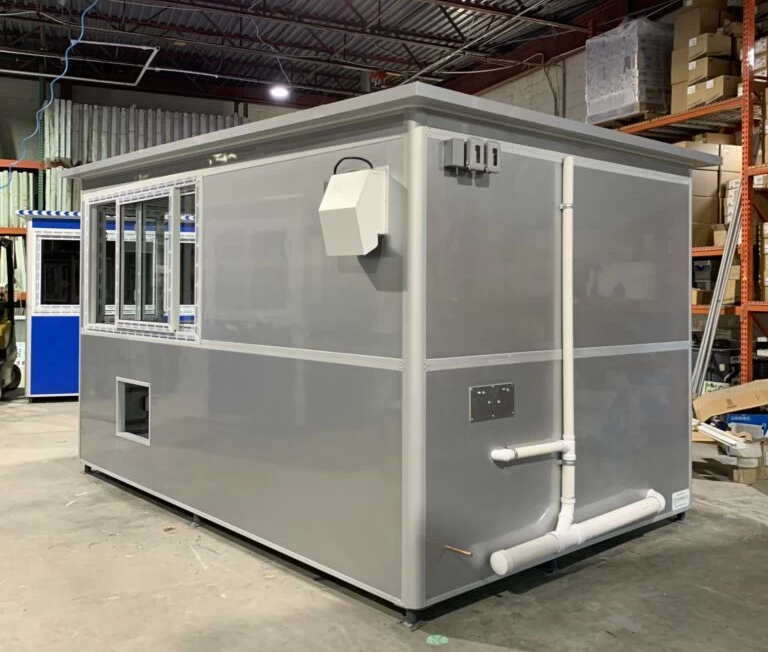
How to Use Portable Booths for Storage on Agriculture Farms
On agriculture farms, adequate storage is crucial for maintaining equipment, tools, suppli…